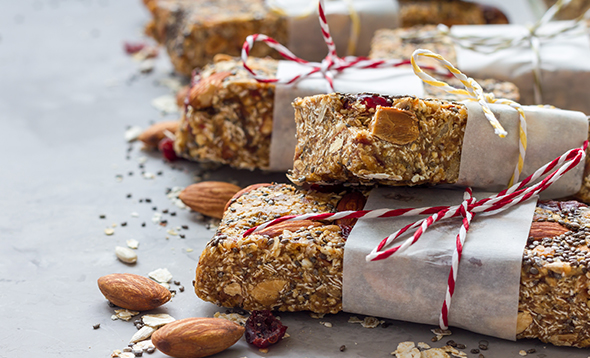That organic living is a conscious health choice
Snack Makeovers
Whether you’re a serial snacker on a mission to trim that muffin top or a nighttime nibbler trying to get on the health bandwagon, there’s no need to eliminate all snacks from your diet. Instead of going the ‘all or nothing’ way, start small.
Here are a few simple swaps that will help you steer clear of the unhealthy stuff – and unnecessary calories - while adding on nutritional value, so you can snack sensibly without the extra side of guilt!
The Snack – French fries from fast food joints
The Swap – Baked sweet potato fries
Why it’s better:
- Rich in beta-carotene
This plant-based orange phytochemical plays a vital role in eye health and aids in reducing the risk of cancer.
- Less total fat
Starchy root vegetables soak up the oil when deep-fried. Baking uses substantially less oil, so you’ll get the flavour and crunch, without the excess calories and fat.
- Less salt
Most fast food places are heavy-handed when it comes to salt. Streamline your sodium intake by adding just a pinch or two of natural sea salt after baking. Alternatively, use sodium-free flavourings like chili peppers, cinnamon, curry powder, or dried Italian herbs. A diet low in sodium can help to lower or avoid high blood pressure, as well as prevent water retention.
The Snack – Bakery biscuits and cookies
The Swap – Dried fruit and nut bars
Why it’s better:
- Less additives
Most dried fruit and nut bars rely on the natural sweetness of dried fruits or honey for flavour, and exclude refined sugars, synthetic stabilisers, preservatives or flavourings.
- Free from flour
It’s a great alternative for individuals sensitive to gluten or those switching to a grain-free diet.
- Rich in fibre
Baked goods are usually made with refined flours and sugars, which have negligible fibre content. Dried fruit, nuts, and seeds, on the other hand, are high in fibre, which helps to promote digestive health.
- Improved fat profile
Nuts and seeds offer heart-healthy monounsaturated fats and anti-inflammatory omega-3 fatty acids, which are often lacking in baked goods. Many convenience store goods also contain partially hydrogenated oils or harmful trans fats that are linked to chronic diseases such as heart disease and cancer.
The Snack - Microwave popcorn
The Swap – Stovetop or air-popped popcorn
Why it’s better:
- Healthier ingredients
Stovetop or air-popped popcorn do not contain artificial butter flavourings or synthetic yellow dyes. Unlike most microwave popcorns, they’re not loaded with synthetic or low-quality butters or processed oil blends.
- Non-carcinogenic
Chemicals from the microwave popcorn bags degrade with the heat and produce harmful carcinogenic compounds that can leach into your popcorn.
- Premium quality
When you make your own popcorn, there’s the option to use healthy and high-quality cold-pressed coconut oil, clarified butter or ghee. You can also adjust the amount of salt to meet your flavour preference.
The Snack – Fruit candies
The Swap - Dried fruits
Why it’s better:
- No unnecessary nasties
Satisfy your sweet tooth while avoiding artificial sweeteners, dyes, preservatives or pesticides. Go organic for high quality dried fruits that are all natural.
- Rich in nutrients
Dried fruits have natural plant pigments with antioxidant and anti-inflammatory properties for immune support and disease prevention. Dried fruits also offer vitamins and minerals that support vital physiological processes.
The Snack – Oil- or honey-roasted cocktail nuts or peanuts
The Swap – Raw or dried nuts
Why it’s better:
- Rich in good fats
Raw or dried nuts are full of heart-healthy monounsaturated fats and anti-inflammatory omega-3 fatty acids.
- Retains nutrients
High-heat cooking can degrade the fragile antioxidants and micronutrients. To reap more health benefits, snack on unprocessed nuts instead.
- Lower in calories
Cooking nuts increases the calorie count per serving and adds oils of a less healthful variety – highly processed vegetable blends. Processed nuts are also often heavily salted, coated with granulated sugars or syrups, which add to the calorie count while raising blood pressure and sugar levels.
The Snack: Butter and sugar buns, kaya toast and jelly doughnuts
The Swap: Whole grain, nut butter and fruit sandwiches
Why it’s better:
- Aids in weight loss efforts
Trading refined white flour for whole-grain breads adds fibre and B vitamins to your diet. The fibre keeps blood sugar levels stable so you’ll stay satiated. The B vitamins boost metabolism and promote weight loss.
- Heart-healthy and anti-inflammatory
Replacing saturated fats such as those in processed butters, with plant-based mono-unsaturated and polyunsaturated oils in nut butters can reduce inflammation and lower the risk of heart diseases.
- Boost gut health
Opt for fresh fruits such as sliced strawberries, banana, grapes or even homemade fruit purees, over refined sugars or gelatinised sugary spreads including kaya or jelly preserves. The natural enzymes and fibre in fruits promote digestive health.
The Snack: Deep-fried white flour puffs and potato crisps
The Swap: Baked, roasted, or dried vegetable, grain and legume chips
Why it’s better:
- Same satisfying crunch, more nutrients
Kale, spinach and broccoli crisps offer just as much crunch as any other thin crisp, but boast minerals such as iron and calcium, as well as fibre. Root vegetable chips – from yams, pumpkins, beets to carrots – are also rich in vitamins, minerals, and phytochemicals including beta-carotene and betalains.
- Energy boost
Snacks made with whole grains (corn, quinoa) and legumes (lentils, chickpeas, soy and mung beans) are chock-full of protein and fibre – both of which keep you satiated for a longer period of time while prolonging energy release.


























_1672804154.jpg)

_1611290459.jpg)